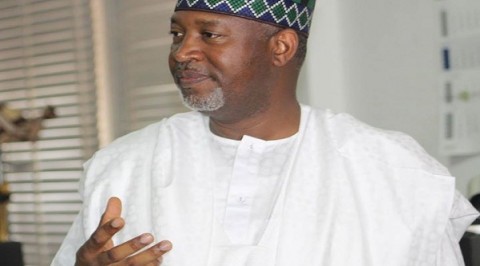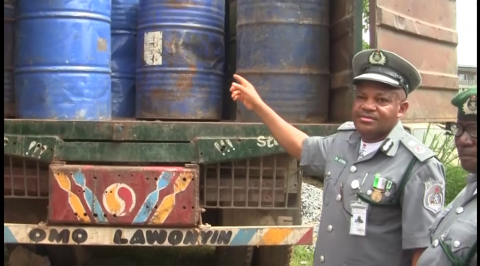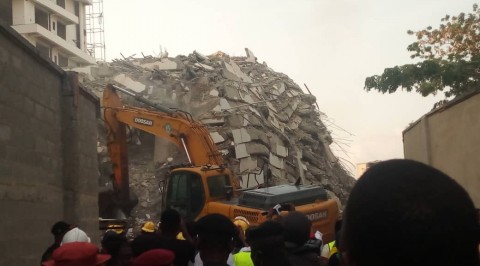Nigeria Lost 109.5m Barrels Of Oil In 2013 - NNPC
The Nigerian National Petroleum Corporation (NNPC) said Tuesday that Nigeria lost 300,000 barrels of crude oil per day or 109.50 million barrels in 2013 from severe attacks on critical export pipelines.
Mr. Andrew Yakubu, the NNPC Group Managing Director (GMD) gave the figures at the ongoing Nigeria Oil and Gas conference in Abuja.
He said incessant vandalism of crude oil export pipelines and domestic crude oil and petroleum product pipelines impacted negatively on the economy.
According to him, what Nigeria lost in 2013 was equivalent to the total output of Equatorial Guinea and larger than the entire production of Ghana, Congo Brazzaville, Cameroun and Gabon.
Yakubu said the lack of such significant production had prompted the federal government to take some drastic actions to tackle the situation due to the negative impact on government’s revenue.
“The initiatives included setting aside N15 billion for the purchase of security equipment to checkmate the scourge of oil theft in the Niger Delta, which was approved by the National Economic Council (NEC).
“Utilisation of new technology and radar surveillance to boost maritime security and increase sea patrol by the Nigerian Navy.
“Inauguration of an Inter-Agency Maritime Operations Coordination Committee to provide synergy among agencies operating in the industry to ensure safety and security in the Nigerian maritime industry.
“Provision of air surveillance of Nigeria’s pipelines with modern aircraft manned by Nigerian pilots trained under the Petroleum Technology Development Fund (PTDF) programme.
“However, these initiatives are in themselves not sufficient to maintain our leading position in oil production in Africa.
He also said government’s commitment to evolving new strategies to checkmate pipeline vandalism stemmed from the need to improve small field economics, new acreage management systems and a new exploration paradigm shift.
“Nigeria’s crude oil production is dependent on key arteries the Trans Forcados Line, Trans Niger Line, Nembe Creek Line and Temidaba-Brass Line. These lines connect to three export terminals – Forcados, Bonny and Brass.
“Presently our oil business environment is plagued with peculiar challenges in the industry and whenever these lines are simultaneously compromised, production shut-ins could be in excess of 300,000 bpd. Therefore it is imperative that we continue to secure these pipelines and also maintain the sanctity of regulation in our operations.
“This brings to mind, the call for a midstream regulator as proposed in the PIB (Petroleum Industry Bill), which will ensure appropriate cost recovery mechanisms for pipeline operators and result in optimum investments in midstream infrastructure nationwide.
“Additional capacity can be readily added and sustained with effective surveillance and security,” Yakubu added.
In her contribution, the Minister of Petroleum Resources, Mrs. Diezani Alison-Madueke, said the current negative public perception of Nigeria’s oil and gas industry represented an opportunity for increased transparency, accountability and responsiveness in the sector.
Speaking yesterday at the conference, the minister also insisted on the deregulation of the downstream sector and the establishment of a critical oil and gas infrastructure protection squad with the responsibility of dealing with crude oil and petroleum products theft, vandalism, outright sabotage and general criminality in the sector.
She said the oil and gas industry in Nigeria had always been at the centre stage of public discourse, adding that this was expected, given the fact that oil is the mainstay of the country’s economy in terms of exports and foreign exchange earnings.
“Recently, of course, this discourse has taken what we might consider unprecedented negative overtones but again, there are pros and cons to everything in the scope of transformation and reformation programmes and the changes that Nigeria is rapidly going through at this time.
“I think that even in the face of these negative overtones, there are great possibilities and advantages to be found in the inherent challenges and I think that that is the way we have to look at them and face them as we go forward,” she said.
She observed that despite these challenges, they represented “an opportunity for increased transparency, increased accountability and responsiveness in the oil and gas sector in Nigeria today”.
In the downstream sector, the minister said there was the need to establish a critical oil and gas infrastructure protection squad with the responsibility of dealing with crude and product theft, vandalism, outright sabotage and general criminality in the sector.
According to her, 5,000 kilometres of the product pipeline network that was built in the 1970s is now virtually unusable in certain areas and this affects product distribution.
She said deregulation remained the only way in which capital investment could be encouraged and new employment opportunities created for both foreign and local openings.
The minister said downstream deregulation remained an important part of the reform framework going forward that would seek to resolve financial sustainability and investor confidence in the sector.
“At the same time, we are aware that being a democratic society, that there has to be a balance among different policies and processes of government and the needs and desires of the people of Nigeria at all times and of course, Nigeria strives to keep that balance as best as we can,” she added.
The minister said though the government had sought to deregulate the downstream sector, continuing regulation has negative effects; enumerating them as: “It is fiscally unsustainable; it is resource demanding; it discourages investments; and principally, it benefits the rich, not the masses in the society that we intend to reach in the first place.”





